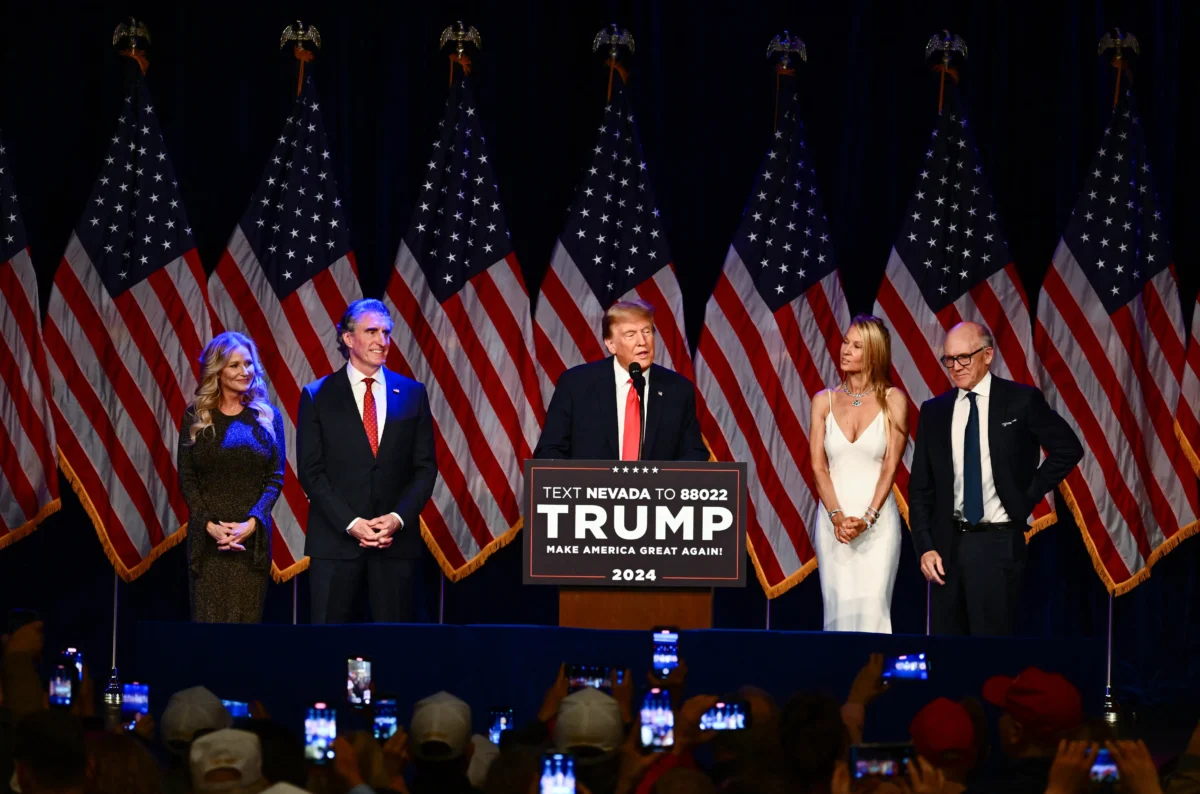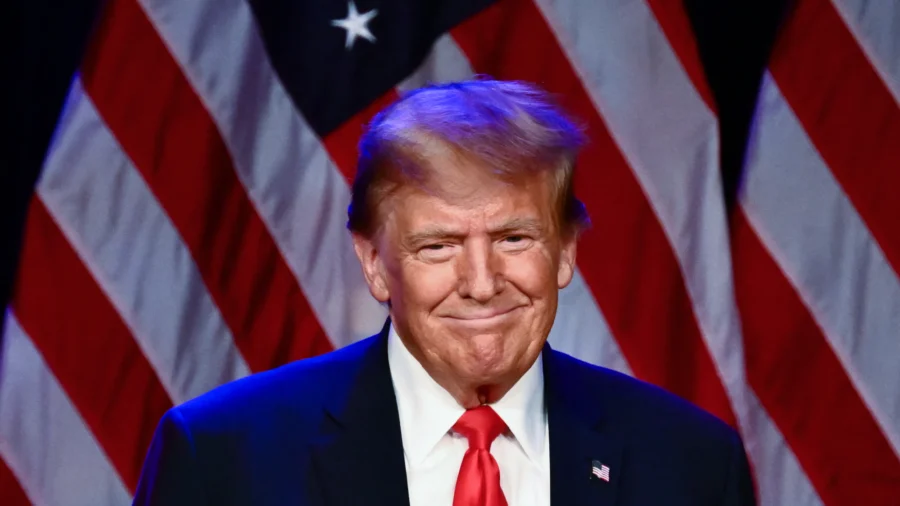LAS VEGAS—Former President Donald Trump, as expected, cruised to victory in the Nevada GOP Caucus on Feb. 8, putting him one step closer to winning his party’s nomination.
The Associated Press called the race for Trump at 11:05 p.m. ET.
The former president faced no significant opposition in the contest. His sole remaining major challenger, former South Carolina Gov. Nikki Haley, opted to instead compete in a Nevada primary two days earlier that didn’t award any delegates. Ms. Haley suffered an embarrassing setback when voters overwhelmingly chose “None of These Candidates” over her in the Feb. 6 contest.
President Trump is now poised to sweep up all the state’s 26 delegates. He also is entitled to at least four delegates in the U.S. Virgin Islands caucus, held the same day as Nevada. In the Virgin Island, he won 74 percent of the votes and Ms. Haley scored about 26 percent.

In Thursday’s Nevada caucus, the only other valid candidate was Ryan Binkley, a Texas businessman whose presidential run has barely registered. He earned less than 1 percent of the votes in last month’s GOP nominating contests in both Iowa and New Hampshire.
In two prior contests, the AP rapidly called the race for President Trump in Iowa on Jan. 10 and in New Hampshire on Jan. 23.
Nevada’s unusual primary-and-caucus situation occurred because the state GOP refused to recognize the state’s new presidential preference primary.
Democrat lawmakers instituted that format under a new law. But the state Republican Party stuck with its time-honored caucuses, meetings where residents gather to discuss the presidential hopefuls and vote for their favorite.
Bruce Parks, chair of Nevada’s Washoe County GOP, told The Epoch Times in a phone interview that he was shuttling among several locations to replenish ballot supplies that had run out.
Mr. Parks said 62,000 ballots were printed for his county alone, where there are more than 103,000 registered Republicans. That’s about 6,000 more than registered Democrats, he said.
Mr. Parks said, “We had lines that went outside the school and around the block at several locations.”
A number of Nevadans, including state Sen. Ira Hansen, posted on X that they were seeing high caucus turnout in their communities.
Mr. Hansen said there were “enormous lines and energy… one of the highest turnouts I’ve ever seen.” Mr. Hansen predicted: “President Trump will have a fantastic night!”
President Trump’s Nevada Caucus victory party came just hours after the U.S. Supreme Court heard oral arguments over removing President Trump from the ballot in Colorado. During questioning, most of the justices expressed skepticism that a ruling affirming the Colorado Supreme Court decision would settle the matter.
President Trump’s challengers allege that he encouraged protesters who breached the U.S. Capitol on Jan. 6, 2021. Therefore, they say President Trump should be barred under the 14th Amendment from seeking the nation’s highest office for aiding in an “insurrection,” a label that President Trump’s supporters say is misapplied.
The eligibility question is just one of many legal challenges the former president faces. He denies wrongdoing and alleges that political foes are backing many civil and criminal cases against him to wage “election interference.” His foes counter that the facts call for the former president to be held accountable.
At the same time, the former president is still attempting to swat away Ms. Haley. The Republican race for presidential nominee heads next to her home state for its “First-in-the-South” primary on Feb. 24.
That vote is traditionally viewed as a major test of a presidential candidate’s viability.
But as the race heads to South Carolina, Ms. Haley appears to be outgunned. Among 15 major endorsers in the Palmetto State, only Rep. Ralph Norman (R-S.C.) sided with her, according to fivethirtyeight.com, a politics-focused website.
In contrast, President Trump’s South Carolina arsenal is fortified with 14 major endorsers.
Those include Gov. Henry McMaster, Lt. Gov. Pamela Evette; Sens. Lindsey Graham and Tim Scott; and Reps. Nancy Mace, Jeff Duncan, Joe Wilson, William Timmons, and Russell Fry.
Nine of those nods came after Florida Gov. Ron DeSantis suspended his presidential campaign on Jan. 21, just before the New Hampshire primary.
In addition, President Trump is far outpacing Ms. Haley in opinion polls.
RealClearPolitics’ (RCP) average of polls showed that President Trump was leading Ms. Haley by almost 30 percent in South Carolina and by 56 percent nationwide.
Also, based on the New Hampshire, Iowa, and Nevada results, President Trump is expected to have up to 58 delegates pledged to him, versus 17 pledged for Ms. Haley, according to a delegate tracker at PeoplesPunditDaily.com.
Those numbers exclude the U.S. Virgin Islands (USVI) totals. While Republican rules say the USVI is entitled to four delegates, officials there said they intended to send more delegates to the Republican National Convention in July. To win the nomination, a candidate would need support from an estimated 1,215 of the total 2,429 delegates, according to Ballotpedia.
This election cycle, the Republican field has winnowed to just two major contenders much faster than anyone can recall.
But because of President Trump’s dominant wins in the early contests, some political analysts say that, in essence, President Trump and President Biden are already going head-to-head against each other.
Despite many citizens’ grave concerns over the U.S.-Mexico immigration crisis, economic conditions, and foreign policy, opinion polls are showing tight margins between President Biden and President Trump.
President Trump was leading the president by fewer than 2 percentage points in the RCP average.
But that lead is within the typical margin of error, which is 3 percent to 4 percent, leaving the two men locked in a statistical tie thus far.
The Associated Press contributed.
From The Epoch Times

